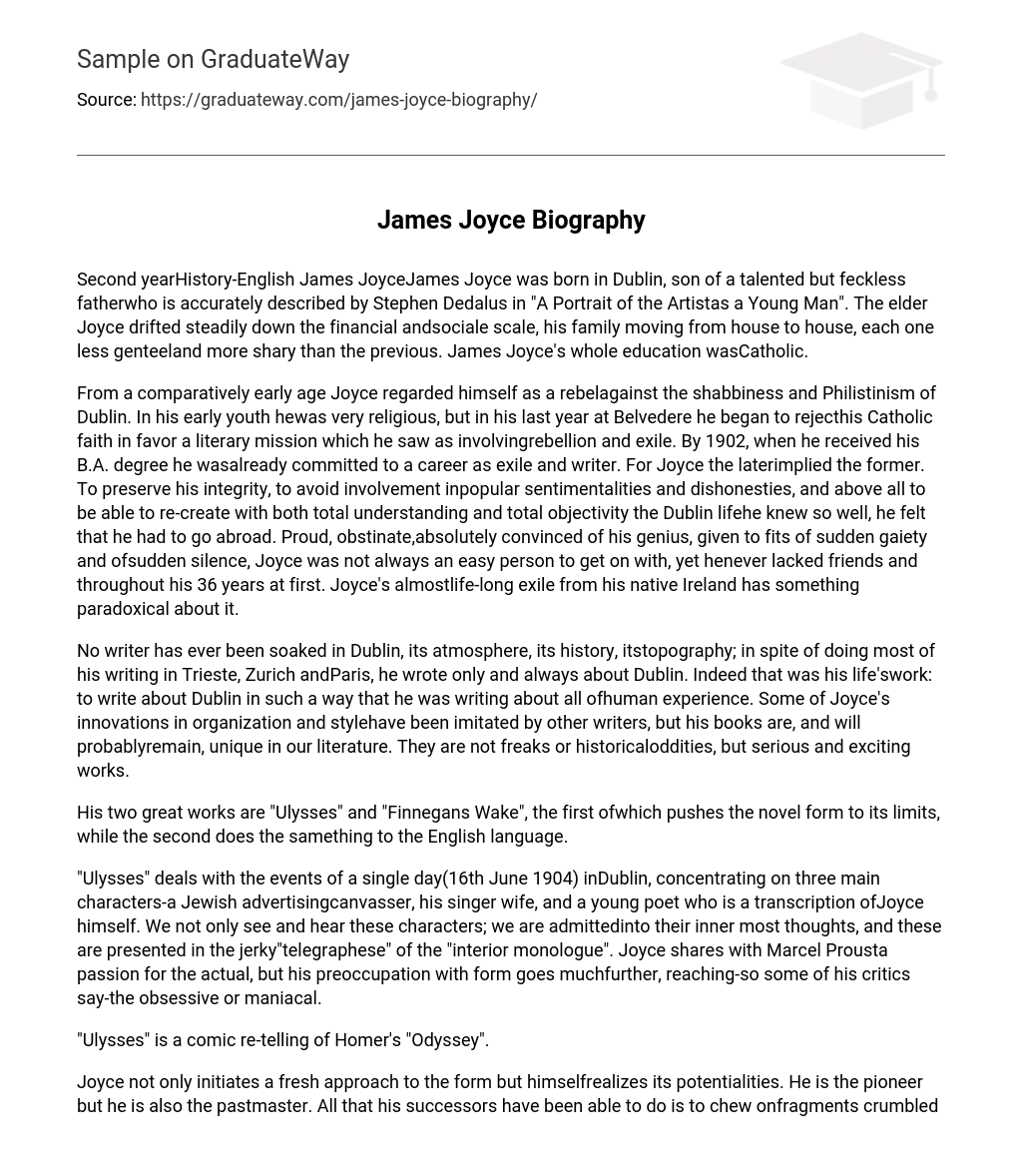Second yearHistory-English James JoyceJames Joyce was born in Dublin, son of a talented but feckless fatherwho is accurately described by Stephen Dedalus in “A Portrait of the Artistas a Young Man”. The elder Joyce drifted steadily down the financial andsociale scale, his family moving from house to house, each one less genteeland more shary than the previous. James Joyce’s whole education wasCatholic.
From a comparatively early age Joyce regarded himself as a rebelagainst the shabbiness and Philistinism of Dublin. In his early youth hewas very religious, but in his last year at Belvedere he began to rejecthis Catholic faith in favor a literary mission which he saw as involvingrebellion and exile. By 1902, when he received his B.A. degree he wasalready committed to a career as exile and writer. For Joyce the laterimplied the former. To preserve his integrity, to avoid involvement inpopular sentimentalities and dishonesties, and above all to be able to re-create with both total understanding and total objectivity the Dublin lifehe knew so well, he felt that he had to go abroad. Proud, obstinate,absolutely convinced of his genius, given to fits of sudden gaiety and ofsudden silence, Joyce was not always an easy person to get on with, yet henever lacked friends and throughout his 36 years at first. Joyce’s almostlife-long exile from his native Ireland has something paradoxical about it.
No writer has ever been soaked in Dublin, its atmosphere, its history, itstopography; in spite of doing most of his writing in Trieste, Zurich andParis, he wrote only and always about Dublin. Indeed that was his life’swork: to write about Dublin in such a way that he was writing about all ofhuman experience. Some of Joyce’s innovations in organization and stylehave been imitated by other writers, but his books are, and will probablyremain, unique in our literature. They are not freaks or historicaloddities, but serious and exciting works.
His two great works are “Ulysses” and “Finnegans Wake”, the first ofwhich pushes the novel form to its limits, while the second does the samething to the English language.
“Ulysses” deals with the events of a single day(16th June 1904) inDublin, concentrating on three main characters-a Jewish advertisingcanvasser, his singer wife, and a young poet who is a transcription ofJoyce himself. We not only see and hear these characters; we are admittedinto their inner most thoughts, and these are presented in the jerky”telegraphese” of the “interior monologue”. Joyce shares with Marcel Prousta passion for the actual, but his preoccupation with form goes muchfurther, reaching-so some of his critics say-the obsessive or maniacal.
“Ulysses” is a comic re-telling of Homer’s “Odyssey”.
Joyce not only initiates a fresh approach to the form but himselfrealizes its potentialities. He is the pioneer but he is also the pastmaster. All that his successors have been able to do is to chew onfragments crumbled from the gigantic cake. But Joyce has sanctifiedexperiment, as well as brought a bigger-than-Jamesian integrity and dignityto the novelist’s vocation, and present-day writers must always be aware ofworking in his shadow.
Joyce occupies a unique place in the history of modern fiction, andit is a high place. A bold experimentalist, he wrote with an abashedrealism and frankness, and made use of a new form of narrative writing andof a new prose style; besides he created a rather startling and brusquevocabulary. Most conspicuous of his innovations is his use of the so called”stream-of-consciousness” or interior monologue technique, the intention ofwhich is to approximate the operation of the human mind, in a waking or adreaming state.
Critics have spoken of him as a great creative artist and thereader of modern fiction will note his marked influence upon many laterwriters.
Bibliography:1. Anthony Burgess “The novel now”2. “The Northon Anthology of English Literature3. “The Literature of England”





